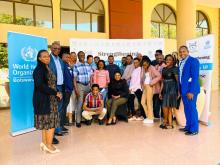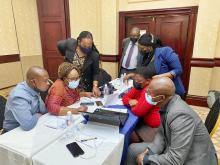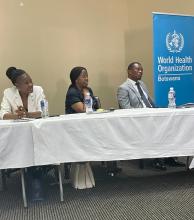Why Botswana needs a comprehensive laboratory policy and strategic plan?
The laboratory plays a major role in the diagnosis of disease conditions as well as in monitoring treatment. This also includes early detection of diseases during emergency response to disease outbreaks before spreading into communities. In this critical process, some policies and procedures need to be in place to achieve quality, timely and reliable results to ensure accuracy in diagnosis as well as appropriate patient care and disease management. As part of assisting all the member states, WHO focuses on intersectoral programs aimed at strengthening laboratory capacity and implementation to achieve desired quality services.
The Chief Medical Laboratory Scientist at the Ministry of Health (MoH) Mr. David Matema considers that as a tourist country, Botswana becomes more cosmopolitan, and the health services should adapt to new requirements. “We have a good infrastructure and what we need to focus on now, is to build trust for the population to confidently use laboratory services in Botswana, not elsewhere. Results offered by the COVID-19 sequencing and services delivered at the highest standard by the national Tuberculosis Reference Lab and the Referral Drug Resistance and HIV Labs prove that we can benchmark here“ states Mr. Matema.
WHO Botswana has been supporting several activities within the MoH through National Health Laboratory (NHL) to strengthen the laboratory sector in the country. These include Botswana SARS-COV-2 Variants of Concern (VOC) monitoring; SARS-COV-2 VOC Surveillance; COVID-19 Biosecurity and Biosafety Compliance; Development of Botswana National Health Laboratory Policy (including the point of care procedure) and the Strategic Plan; and Establishment of Laboratory Partners Forum.
These activities are implemented through the Country Operational Plan (COP21) of the United States Centers for Disease Control and Prevention (CDC) and the American Rescue Plan Act (ARPA) funding.
The country office engaged quality and experienced technical assistance through the different levels of organization for the development of the normative guidance documents and realization of the laboratory partners' forum. In collaboration with the regional office (WHO AFRO), several workshops and consultations were employed in August and September 2022 in Botswana.
Mrs. Bazibi Moiteelasilo, the Lead of the HIV Reference Lab at Ngangabgwe Referal Hospital and Blood Transfusion Center in Francistown mentions “We have an opportunity with this new policy to strengthen the laboratory services at the country level through improvement of physical structure and equipment. To standardize the equipment placement across different tiers of the laboratory is necessary and will aid in improving the services.”
To conduct a systematic approach in the drafting of the Botswana National Laboratory Policy and the Strategic Plan, various laboratory stakeholders in Botswana were brought together in two workshops in Gaborone. Preliminary background activities were undertaken by the local technical working group, to identify gaps and consolidate existing documents through the leadership and guidance of the NHL management. The stakeholders gathered between 24 and 28 October to work on the validation of the Botswana Health Laboratory Policy and Strategic Plan. Once this activity concluded, the groundbreaking Botswana National Health Laboratory Multisectoral Partners Forum convened. The participants agreed on tasks to develop the terms of reference for the forum members as well as a roadmap of the newly established coordination mechanism.
The Diagnostics Advisor at WHO AFRO Dr. Sheick Oumar Coulibaly considers that “according to Maputo Declaration of 2008 there is a high need for African countries to develop a comprehensive national laboratory policy and strategic plan to improve public health laboratory and quality management services. Botswana has taken a step in the right direction. The most difficult task is to be organized in implementing policies and strategic plans. Implementation is not only done by the lab services but by all partners and departments in MoH hence the need for the Health Laboratory Partners Forum. WHO is pleased to see this initiative started and implemented in Botswana”.






